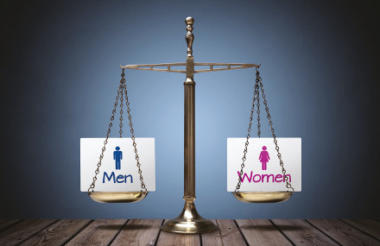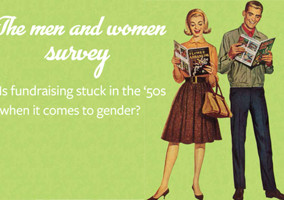Thirty-eight per cent of female fundraisers and 15 per cent of male fundraisers say they have been subjected to sexual harassment while working at their charity, according to a survey by Fundraising Magazine.
The magazine's first ever Men and Women’s Survey also found that only 41 per cent of female fundraisers feel women are adequately represented at senior level. However 71 per cent of men feel women are adequately represented.
The survey also found that eight separate barriers to female progression are identifed by the majority of women, whereas only "women having to balance work and family" is identified as a barrier to progression by the majority of men.
The survey was open for six weeks between 9 August and 16 September 2016, and received some 540 responses – 415 from female fundraisers and 122 from men, with 3 respondents not giving a gender.
Sexual harassment
The survey found that one-third of all respondents – male and female – reported having been subject to “unwanted advances, contract or commentary based on their sex” while working.
38 per cent of female respondents said they’d experienced sexual harassment. The most common place female respondents reported sexual harassment was in their own offices, but nearly one in three reported harassment while “dealing with suppliers and donors”.
15 per cent of male respondents also said they’d been subjected to sexual harassment – with the vast majority of those respondents saying it had taken place in their workplaces.
Commenting on the findings of the survey in an seperate editorial, Helen McEachern, director of fundraising at ActionAid UK, said: “Even in a sector that works to protect the rights of society’s most vulnerable, this study found that casual sexism and harassment is still rife. Sexism shows a lack of respect and if there isn’t respect how can women be confident to seek higher-level positions or feel empowered when they are in them? We need to talk about this sexism and call it out.”
The figure is lower than the wider workplace. A TUC survey found that more than half of all women report having been sexually harassed at work.
Adequate representation
The survey found that only two fifths of the female workforce believe they are adequately represented at director level.
Despite women accounting for some 74 per cent of the total fundraising sector work-force, only 44 per cent of directors at the top 100 fundraising charities are female. Only 16 of this year's 50 Most Influential fundraisers were women.
The survey did find however that similar numbers of both male and female fundraisers respondents reported to have applied for a promotion in the last two years. Indeed 52 per cent of female respondents applied for a promotion in the last 2 years, compared with 51 per cent of male respondents.
Significant barriers
Of the female respondents, 72 per cent agreed or strongly agreed with the statement that the need to “balance work and family” was a barrier to women's progression in fundraising. “Women lacking confidence” was listed as the second most significant barrier, at 59 per cent, and “organisation culture” was third, at 58 per cent.
In comparison to the diverse reasons female respondents gave when asked about barriers to women’s progression in the fundraising sector, male respondents identified only one significant barrier: the need for women to balance work and family. Nearly 70 per cent of male respondents strongly agreed or agreed that this was the biggest issue facing female fundraisers.
However, on the other two issues identified by women as being the biggest barriers to adequate representation in the higher echelons of the profession, only 31 per cent of male respondents strongly agreed or agreed that women lacked confidence. While less than half agreed or strongly agreed that organisational culture was a barrier to female progression.
Well over half of female respondents also said there was a lack of senior female role models in senior positions within fundraising. Only 36 per cent of male respondents agreed with that sentiment.
The full details of the survey can be seen here.
Related Articles












